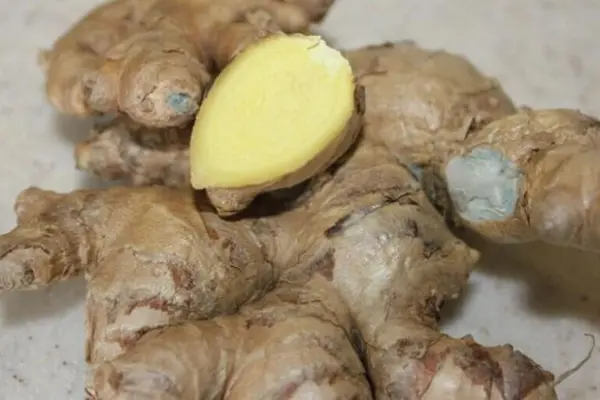Ginger is a popular spice that adds a unique flavor and aroma to many dishes. It’s also known for its health benefits, including its ability to aid in digestion and reduce inflammation.
However, like all food, ginger can go bad over time. It’s important to know how to tell if ginger is bad so that you can avoid consuming spoiled or rotten ginger, which can lead to food poisoning or other health issues.
In this blog post, we’ll go over some simple tips on how to tell if ginger is bad and how to store it properly to keep it fresh for as long as possible. So, let’s get started!
Does Ginger Go Bad?
Yes, ginger can go bad over time. Like much other fresh produce, ginger is perishable and will eventually spoil or rot.
The shelf life of ginger depends on a number of factors, including how it is stored, how it is processed, and how it is grown.
The fresh ginger root that has been properly stored can last for several weeks or even a few months, while dried ginger or ginger that has been made into a paste or powder may last longer.
How To Tell If Ginger Is Bad: 5 Signs That Ginger Has Gone Bad
Here are five signs that ginger may have gone bad:
1. An Off Smell
Fresh ginger should have a slightly spicy and slightly sweet aroma. It may be spoiled if the ginger has an off smell, such as a musty or sour smell.
2. A Slimy Or Moldy Appearance
If the ginger is slimy or covered in mold, it is likely spoiled and should be discarded.
3. A Loss Of Flavor
Ginger should have a slightly spicy and slightly sweet flavor. It may have gone bad if the ginger has a bland or off flavor.
4. Dry Or Shriveled Appearance
Fresh ginger should be firm and smooth. It may be past its prime if the ginger looks dry or shriveled.
5. Soft Or Mushy Texture
Fresh ginger should be firm and slightly fibrous. If the ginger is soft or mushy, it may be spoiled.
If you notice any of these signs, it’s best to discard the ginger and purchase a fresh batch. It’s always better to be safe than sorry when it comes to consuming potentially spoiled or rotten ginger.
Ginger: How to Tell if Ginger has Gone BAD!
Why Does Ginger Get Moldy?
There are several reasons why ginger may get moldy. One reason is improper storage. Ginger is a root vegetable; like other root vegetables, it is sensitive to moisture and humidity. If the ginger is stored in a damp or humid environment, it is more likely to develop mold.
Another reason for moldy ginger is improper handling. If the ginger is handled with dirty hands or utensils, it can become contaminated with bacteria or mold spores, which can lead to spoilage.
Ginger that has been cut or sliced may also be more prone to mold growth. When the surface of the ginger is exposed to air, it becomes more vulnerable to bacterial and mold contamination.
Finally, ginger that is past its prime or has been stored for an extended period of time is more likely to become moldy. As ginger ages, it becomes more susceptible to spoilage and may develop mold as a result.
How Do You Keep Ginger From Molding?
Here are a few tips for keeping ginger from molding:
Store Ginger In The Refrigerator: Ginger is a root vegetable and is sensitive to moisture and humidity. Storing ginger in the refrigerator can help reduce mold growth risk.
Wrap Ginger In A Paper Towel: Wrapping ginger in a paper towel can help absorb excess moisture, preventing mold from forming.
Store Ginger In A Sealed Container: Placing ginger in a sealed container, such as a plastic bag or container, can help to prevent the ginger from coming into contact with moisture and humidity.
Use Ginger Within A Few Weeks: Ginger will last longer if it is used within a few weeks of purchase. The longer ginger is stored, the more likely it is to spoil or develop mold.
Freeze Ginger: Ginger can be frozen for longer storage. To freeze ginger, peel and slice it into small pieces, then place it in a plastic bag or container and store it in the freezer. Frozen ginger will last for several months.
By following these tips, you can help to keep ginger fresh and prevent it from molding.

Does Ginger Keep Better In The Fridge?
Yes, ginger generally keeps better in the refrigerator. To store ginger in the refrigerator, wrap it in a paper towel and place it in a plastic bag or container.
Storing the ginger in a sealed container will also help to keep it fresh and prevent it from coming into contact with moisture and humidity.
Ginger can also be frozen for longer storage. To freeze ginger, peel and slice it into small pieces, then place it in a plastic bag or container and store it in the freezer. Frozen ginger will last for several months.
How Long Can Ginger Last In The Fridge?
Ginger can last for several weeks or even a few months in the refrigerator if it is stored properly. The shelf life of ginger depends on a number of factors, including how it is grown, how it is processed, and how it is stored.
What Is The Best Way To Store Ginger?
The best way to store ginger is to wrap it in a paper towel and place it in a plastic bag or container in the refrigerator. The paper towel will help absorb excess moisture, preventing the ginger from becoming slimy or moldy. Storing the ginger in a sealed container will also help to keep it fresh and prevent it from coming into contact with moisture and humidity.
Ginger can also be stored in the freezer for longer storage. To freeze ginger, peel and slice it into small pieces, then place it in a plastic bag or container and store it in the freezer. Frozen ginger will last for several months.
It’s important to store ginger in a cool, dry place to prevent it from spoiling or going bad. Avoid storing ginger in a warm or humid environment, as this can accelerate spoilage and lead to the growth of mold.
Overall, the key to storing ginger is to keep it cool and dry and to use it within a few weeks to ensure it stays fresh.
How Do You Store Ginger For A Year?
There are a few ways to store ginger for a longer period of time, such as a year:
1. Freeze Ginger
Ginger can be frozen for longer storage. To freeze ginger, peel and slice it into small pieces, then place it in a plastic bag or container and store it in the freezer. Frozen ginger will last for several months, up to a year, if stored properly.
2. Dry Ginger
Ginger can be dried and stored as a powder or slice. To dry ginger, slice it into thin pieces and place it in a single layer on a tray. Place the tray in a dry, well-ventilated area and allow the ginger to dry for several days.
Once the ginger is fully dry, store it in an airtight container in a cool, dry place. Dried ginger will last for several months to a year.
3. Make Ginger Paste
Ginger can also be made into a paste and stored in the freezer. To make ginger paste, peel and chop the ginger, then blend it with a little water to create a smooth paste. Transfer the paste to an ice cube tray and freeze until solid.
Once frozen, transfer the ginger cubes to a plastic bag or container and store them in the freezer. The ginger paste will last for several months to a year in the freezer.
By freezing, drying, or making ginger into a paste, you can store it for longer, such as a year.
Conclusion
In conclusion, knowing how to tell if ginger is bad is an important skill to have as ginger is a commonly used ingredient in many dishes.
There are a few key signs to look out for when determining if ginger has gone bad. These include a strong, pungent smell, a soft or slimy texture, and visible mold. If you notice any of these signs, it is best to discard the ginger and use a fresh piece.
On the other hand, if the ginger looks and smells fresh, it is likely still good to use. By following these simple tips, you can ensure that the ginger you use in your cooking is fresh and flavorful, resulting in delicious dishes every time.
- Jet’s Ranch Recipe: Make The Famous Dip At Home - April 12, 2025
- James Hemings Macaroni And Cheese Recipe – History On A Plate - April 3, 2025
- French Dip Squares Recipe – Better Than A Sandwich! - March 25, 2025


